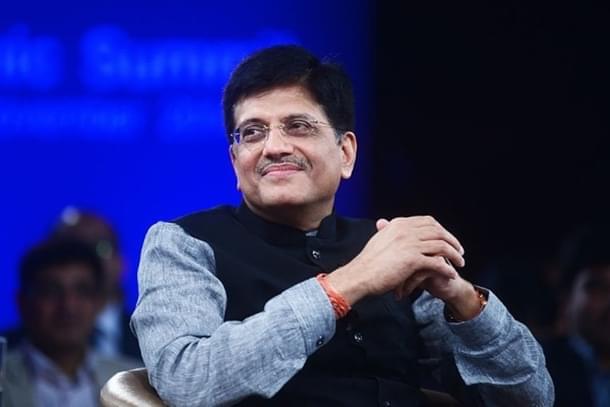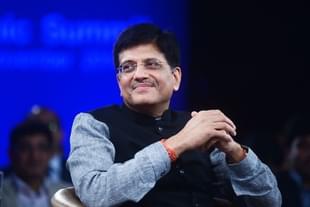Business
Piyush Goyal To Visit UK 26-27 May For Review Of FTA Talks With Government And Businesses
Swarajya Staff
May 21, 2022, 12:50 PM | Updated May 23, 2022, 11:44 AM IST
Save & read from anywhere!
Bookmark stories for easy access on any device or the Swarajya app.


India and the UK could set a faster pitch in the run-up to the conclusion of negotiations for the free trade agreement by Diwali 2022 as Commerce Minister Piyush Goyal visits the UK for a visit on 26-27 May 2022 to take forward the parleys.
Goyal will hold discussions with the government and businesses on the progress made in the FTA negotiations and the way forward, the Commerce Ministry confirmed. During the summit meeting between the Prime Ministers of India and the UK, the two leaders had set the timeline of Diwali 2022 for finalisation of the FTA between the two countries.
Goyal's visit is important as the process of finalisation of the India-UK FTA gains traction with the draft treaty text advancing across the majority of chapters at the end of the third round of talks, as per the UK's Department for International Trade.
The first two rounds have mostly been about the negotiating teams sharing their priorities, understanding the more challenging issues, and where quick wins can be achieved.
The first round of negotiations were extensive and made up of 32 separate sessions covering 26 policy areas including important issues for trade and investment in both goods and services, such as IP and customs procedures, as well as digital and telecommunications. Round two saw technical experts from both sides come together for discussions in 64 separate sessions covering the same 26 policy areas.
In the third round, technical experts from both sides came together for discussions in 60 separate sessions covering 23 policy areas, said a "joint outcome statement" issued at the end of the talks held in New Delhi in a hybrid fashion after the visit of Prime Minister Boris Johnson to India.
With the fourth round of negotiations due to be hosted by the UK in June 2022, both sides are looking at a win-win scenario to strengthen ties across trade, investment, climate and health as the countries recover from the twin shock of Covid and the Ukraine crisis.
For the UK, securing a FTA with India could almost double its exports to one of the fastest growing Asian economies and boost Britain's total trade by as much as £28 billion a year by 2035 and increase wages across the UK regions by £3 billion. The Confederation of British Industry, the UK's biggest business organisation has called for a focus on lowering barriers to trade which CBI President Karan Bilimoria feels is now essential.
"An FTA with the world's fastest growing economy is now within touching distance and more broadly, a deal anchored in slashing tariffs, improving the ability to move talent across borders as well as data will unlock plenty of prizes across a host of sectors from services and life sciences to tech and innovation," says Bilimoria.
To expedite matters, the CBI and the Confederation of Indian Industry representing over 300,000 businesses, is setting up a new joint initiative, the UK-India Business Commission to increase cross industry collaboration and to push the UK-India trade deal over the line.
The Commission will provide a critical forum for discussion to ensure an FTA works to the benefit of businesses in both countries. The group will provide continual oversight and meet ahead of key milestones to take views on trade-offs and help feed in on-the-ground business intelligence at a ministerial level in India and UK. With the ongoing negotiations aiming at reducing the barriers to trade, cutting tariffs, the Commission will work on breaking down barriers and help support the export plans of firms and help businesses navigate the market access.
Both the industry bodies are keen to use the partnership to address shared concerns, identify common interests as well as cover joint efforts in specific areas such as advancing technology and digitalisation, climate change and sustainability, multilateral collaboration and their alignment on the FTA, points out Chandrajit Banerjee, Director General, CII.
The UK has a globally reputed renewable sector which in particular could play an integral role in India's transition to clean energy at a time when India has committed to get 50 per cent of its energy from renewable sources by 2030. The new Commission could play a crucial role in reducing tariffs on green exports such as solar, onshore, and offshore wind, thus opening up new opportunities for firms in India.
The UK has expertise on renewables and the FTA can offer an opportunity to export this skillset in cleantech. A deal has the potential to drastically lower tariffs on wind turbines parts that are currently as high as 15 per cent.
In the food and drink sector lower tariffs, aligned standards, simpler customs procedures, and investor protections are the targets being eyed to create jobs and growth across both countries, expand exports and offer consumers lower prices and greater choice. A matter of contention could be import tariffs on consumer food products which range from 0 to 150 per cent.
Phased reduction of the duty burden on premium spirits including Scotch, which currently stands at 150 per cent, is a key item in the wishlist for the UK. Recent years have seen significant UK investment in the domestic spirits sector in India, with British companies supporting innovation, value creation and driving the globalisation of iconic Indian brands. A tariff reduction by India will help to bring in from the UK a premium segment of wines and spirits that can grow the market for all players, including growth of the hospitality and tourism market.
For the UK, the India-Australia deal offers an example where drug regulators in both nations will work together to facilitate trade in human prescription medicines and medical devices. Similar collaboration between India's and UK's authorities would be positive. Such wins in a UK-India agreement will open up many more opportunities to boost bilateral trade, build on the hundreds of thousands of jobs in both countries and support investment.





